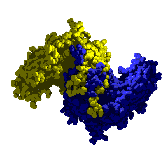Linda C. Kurz, Ph.D
Research Assistant Professor
Department of Biochemistry and Molecular Biophysics
The molecular origins of the extraordinary catalytic power of enzymes
continue as one of the major questions in
biochemistry.  We are concentrating on citrate synthases.
These enzymes are prominent in the energy-yielding
pathways of a large variety of organisms from psychrophiles to
hyperthermophiles. Citrate synthases are prototypes
for several important catalytic strategies: carbonyl polarization to
increase reactivity of the electrophilic substrate,
facilitation of formation of a nucleophilic substrate carbanion, the use
of unusual ionization states of histidine residues
as acid catalysts, and changes in macromolecular conformation. Previous
work in our laboratory has concentrated on
demonstrating the existence and importance of carbonyl polarization and
carbanion formation. Our present emphasis
is on largely unanswered questions of their structural base. We are
using the techniques of site-directed mutagenesis
to selectively alter residues in the active site and elsewhere guided by
the predictions of structural and theoretical
studies. In addition to transient and steady-state kinetic methods, we
use techniques such as FTIR and NMR
spectroscopy, which are sensitive to local bond distortions, electronic
environment, and other factors likely to reflect
operation of the catalytic machinery. In a new project, we are
investigating the catalytic role of protein dynamics and
flexibility by detailed mechanistic comparisons in a series of
structurally homologous citrate synthases originating in
organisms optimized to function at widely different temperatures. We are
correlating the relative stabilities of the
intermediates and transition states with temperature revealing which
elementary steps in the mechanism are modulated
by protein flexibility and dynamics.
We are concentrating on citrate synthases.
These enzymes are prominent in the energy-yielding
pathways of a large variety of organisms from psychrophiles to
hyperthermophiles. Citrate synthases are prototypes
for several important catalytic strategies: carbonyl polarization to
increase reactivity of the electrophilic substrate,
facilitation of formation of a nucleophilic substrate carbanion, the use
of unusual ionization states of histidine residues
as acid catalysts, and changes in macromolecular conformation. Previous
work in our laboratory has concentrated on
demonstrating the existence and importance of carbonyl polarization and
carbanion formation. Our present emphasis
is on largely unanswered questions of their structural base. We are
using the techniques of site-directed mutagenesis
to selectively alter residues in the active site and elsewhere guided by
the predictions of structural and theoretical
studies. In addition to transient and steady-state kinetic methods, we
use techniques such as FTIR and NMR
spectroscopy, which are sensitive to local bond distortions, electronic
environment, and other factors likely to reflect
operation of the catalytic machinery. In a new project, we are
investigating the catalytic role of protein dynamics and
flexibility by detailed mechanistic comparisons in a series of
structurally homologous citrate synthases originating in
organisms optimized to function at widely different temperatures. We are
correlating the relative stabilities of the
intermediates and transition states with temperature revealing which
elementary steps in the mechanism are modulated
by protein flexibility and dynamics.